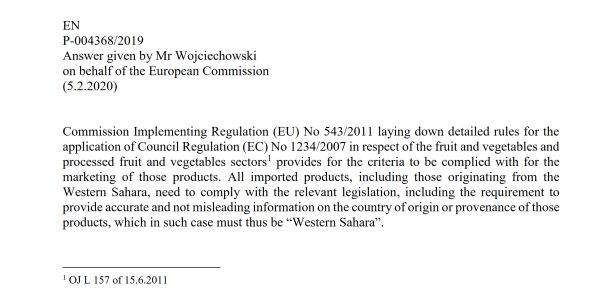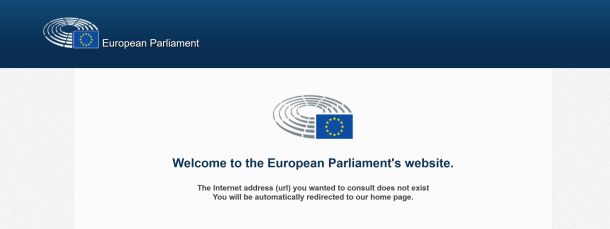
Selon le Conseil de l'UE, il ne peut pas rendre public un avis juridique sur un futur accord commercial UE-Maroc au Sahara Occidental occupé, car cela "comporte le risque de compromettre la capacité de parvenir à un accord sur le dossier".
Western Sahara Resource Watch (WSRW) a reçu le refus d'un accès à l'avis juridique du Conseil sur le projet d'extension de l'accord commercial UE-Maroc au Sahara Occidental occupé. Cette information a été communiquée par le Secrétariat général du Conseil de l'Union européenne le 7 décembre 2018.
Trouvez ici notre demande, et la réponse du Conseil ci-dessous.
Dans sa lettre, le secrétariat du Conseil de l'UE affirme qu'il ne peut pas rendre public son avis juridique pour plusieurs raisons. Voici comment la Commission argumente - et le commentaire de WSRW sur ces arguments :
- "le processus de décision auquel se réfère la contribution demandée est en cours. Au stade actuel, l'accord du Parlement européen est requis. La divulgation de l'avis juridique présenterait donc le risque de compromettre la capacité de parvenir à un accord sur la dossier".
Cela suggère apparemment que la divulgation de l'avis aurait un effet négatif sur le résultat souhaité par le Conseil c'est à dire que le Parlement soutienne la proposition. Dans un mois, tous les membres du Parlement voteront en plénière sur l'accord proposé. Bien que des questions sur la légalité de la proposition demeurent, le Conseil choisit de ne pas être transparent en ce qui concerne son avis juridique, car cela pourrait diminuer les chances de voir l'accord aboutir. Cela soulève de sérieuses questions sur le contenu de l'avis. WSRW suggère que si les arguments juridiques sont si faibles que le Conseil estime que le Parlement ne les soutiendra pas, alors l'accord ne doit pas être approuvé.
- parce que le document "contient des conseils juridiques concernant des questions relatives à la conduite des relations internationales de l'Union".
Pendant des mois, des représentants de la Commission européenne et des membres du Parlement européen favorables à l'accord ont affirmé qu'il s'agissait d'un accord commercial technique et que, de ce fait, les implications politiques plus larges ne devraient pas être prises en compte. Les États membres ont exprimé leur confiance que l'accord proposé ne mettra aucunement en danger le statut du Sahara Occidental. La Commission européenne a même écarté l'opposition violente du Front Polisario - la représentation reconnue par l'ONU du peuple du Sahara Occidental - à cet accord, affirmant que sa position ne tenait pas à des raisons économiques, mais plutôt à des raisons politiques. À présent, le Conseil affirme que "la divulgation des avis et des problèmes traités compromettrait la protection des relations internationales". Ce n'était donc pas seulement une affaire commerciale ?
- "divulguer l'avis juridique pourrait également affecter la capacité du service juridique à défendre efficacement les décisions prises par le Conseil devant les tribunaux de l'Union."
Si l'avis juridique est solidement fondé en droit, il ne devrait pas être difficile de le défendre devant les tribunaux - qu'il ait été rendu public ou non. Là encore, cela suscite des inquiétudes quant au contenu de l’avis.
- "le service juridique pourrait être soumis à des pressions externes qui pourraient affecter la manière dont les conseils juridiques sont formulés et, partant, compromettre la possibilité pour le service juridique d'exprimer ses vues sans subir d'influences externes".
C’est une pensée extrêmement troublante dans un système d’état de droit telle que l’Union européenne qui valorise l’indépendance de la justice. Il incombe à un service juridique de vérifier la conformité de la proposition avec la loi et de donner sur cette base des conseils permettant de déterminer si la proposition est acceptable ou non. La transparence ne met pas en péril la libre expression des juristes - le secret et l'influence du gouvernement pourraient constituer une bien plus grande menace.
--------------------------------------------------------------------------------
7 December 2018
Ref. 18/2306-mj/jg
Requests made on: 22.11.2018
Dear Ms Eyckmans,
Thank you for your request for access to "the legal opinion of the Council on the proposed Agreement in the form of an Exchange of Letters between the European Union and the Kingdom of Morocco on the amendment of Protocols 1 and 4 to the Euro-Mediterranean Agreement establishing an association between the European Communities and their Member States, of the one part and the Kingdom of Morocco, of the other part".
Document 10738/18 RESTREINT UE/EU RESTRICTED was identified as corresponding to your request.
This document is a Contribution of the Council Legal Service which discusses legal questions related to the draft agreement in the form of an exchange of letters between the European Union and the Kingdom of Morocco (hereinafter "draft agreement") on the amendment of Protocols 1 and 4 to the Euro-Mediterranean Agreement establishing an association between the European Communities and their Member States, on the one part, and the Kingdom of Morocco, on the other part (hereinafter "Association Agreement").
This document is classified at the level of RESTREINT UE/EU RESTRICTED, meaning that it contains information the unauthorised disclosure of which could be disadvantageous to the interests of the European Union or of one or more of its Member States:
The requested contribution of the Council Legal Service examines the consistency of the draft agreement with regard to:
- the negotiating directives accompanying the Council decision of 29 May 2017 authorising the Commission to open negotiations with Morocco on the adaptation of the Protocols to the Association Agreement;
- the judgment of the Court of Justice of 21 December 2016 in Case C-104/16 P (Council v. Front Polisario).
The document consequently contains legal advice touching upon issues which relate to the conduct of the international relations of the Union.
In view of its subject-matter, disclosure of the advice and the issues with which it deals would undermine the protection of international relations under Article 4(1)(a) third indent of Regulation (EC) No 1049/2001 of the European Parliament and of the Council of 30 May 2001 regarding public access to European Parliament, Council and Commission documents. As the biggest part of the contribution analyses the draft agreement in the light of the negotiation directives attached in the Council decision of 29 May 2017, its disclosure would make publically known information on the scope and the objectives of the negotiation mandate at a time when the agreement is not yet adopted.
In addition, the legal issues discussed in the contribution go beyond the present file and the analysis provided therein could be transposed each time an agreement between the same parties is envisaged. In particular, this analysis is relevant as regards the new Fisheries Partnership Agreement between the EU and Morocco to be concluded in the near future. It appears, therefore, that the legal advice contained in the requested contribution is of a wide scope affecting future files.
Disclosure of such a document would therefore undermine the protection of legal advice under Article 4(2), second indent, of Regulation (EC) No 1049/2001. It would make known to the public an internal opinion of the Legal Service, intended for the members of the Council. Moreover, disclosure of the legal advice could also affect the ability of the Legal Service to effectively defend decisions taken by the Council before the Union courts. Lastly, the Legal Service could come under external pressure which could affect the way in which legal advice is drafted and hence prejudice the possibility of the Legal Service to express its views free from external influences.
Moreover, the decision-making process to which the requested contribution refers to is currently ongoing. At the current stage, the consent of the European Parliament is required. Disclosure of the legal advice would hence carry the risk compromising the capacity of reaching an agreement on the dossier and thus undermine the decision-making process of the Council pursuant to Article 4(3) first subparagraph of Regulation (EC) No 1049/2001.
As regards the existence of an overriding public interest in disclosure, the General Secretariat considers that, on balance, the principle of transparency which underlies the Regulation would not, in the present case, prevail over the above indicated interest so as to justify disclosure of the document.
In the view of the foregoing, the General Secretariat of the Council is unable to grant you access to this document. Partial access shall also be refused, the requested contribution being covered in its entirety by the aforementioned exceptions provided by Regulation (EC) No 1049/2001.
You can ask the Council to review this decision within 15 working days of receiving this reply (confirmatory application).
Yours sincerely,
Paulo VIDAL
La Commission de l'UE recule sur l'étiquetage des produits du Sahara
Quelle est la position de l'UE sur l'étiquetage des produits du Sahara Occidental occupé ? La Commission européenne a publié pour la troisième fois une réponse à une question parlementaire sur le sujet, mais la dernière version ne répond pas à la question.
Pourquoi cette déclaration de l'UE continue à disparaître ?
Une clarification de la Commission Européenne sur l'étiquetage des produits du Sahara Occidental a été publiée, puis supprimée, puis publiée à nouveau et a été supprimée à nouveau des sites Internet de l'UE.
Confirmation: les produits du Sahara Occidental à étiqueter comme tels
Il y a deux semaines, la Commission européenne a annoncé que les produits du Sahara Occidental doivent être étiquetés comme tels, pour retirer cette déclaration dès le lendemain. Aujourd'hui, la Commission réaffirme sa position initiale.
Retournement spectaculaire de la CE sur l'étiquetage du Sahara
Le 5 février 2020, la Commission européenne a annoncé que les produits du Sahara Occidental devraient être étiquetés en conséquence. Mais environ 24 heures plus tard, toutes les traces de cette déclaration ont été supprimées des sites Web de l'UE.



